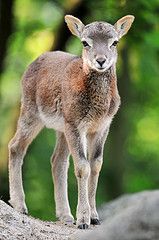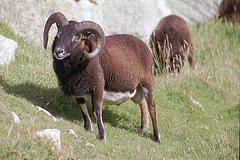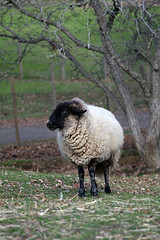 More than 10,000 years ago, the ancestor of domestic sheep did not have wool. Not in the traditional sense, anyways. The mouflon sheep at your right is considered the ancestor of "wool" sheep. Their hair/wool is soft and sheds annually in the spring and summer. The soay sheep (below left) is another example of a wild sheep with the most natural of wool, the kind that doesn't just keep growing.
More than 10,000 years ago, the ancestor of domestic sheep did not have wool. Not in the traditional sense, anyways. The mouflon sheep at your right is considered the ancestor of "wool" sheep. Their hair/wool is soft and sheds annually in the spring and summer. The soay sheep (below left) is another example of a wild sheep with the most natural of wool, the kind that doesn't just keep growing. People could still spin the fiber, it just needed to be collected instead of shorn and there wasn't a lot of it to use. So thus the domestication process began.
People could still spin the fiber, it just needed to be collected instead of shorn and there wasn't a lot of it to use. So thus the domestication process began.It's amazing how so very different domestic sheep are from their wild ancestors. Most breeds have long, wooly tails - wild sheep do not. Sheep tails' are generally docked, sometimes leaving the animals with absolutely no rear-end protection. Wild sheep have hair or shedding wool - domestic sheep, if left unshorn, would die from exhaustion or heat stroke within a couple of years or be burdened with 50+ lbs of extra wool. We took perfectly adaptable creatures and selectively bred for traits that are useless in nature and, even more tragic, deadly for the animals without our intervention. How arrogant of us to make these animals so reliant on humans that, if left to their own devices, would probably become weighed down by wool and die within a few years (months if in arid, desert climates).
The sheep at the sanctuary are a variety of different breeds. Some have rea
 lly thick wool that you cringe looking at (imagine wearing an extra 20 lbs!) others have less wool to worry about. They are all sheared annually to prevent heat stroke and overgrowth of the wool. We do not tail dock or dehorn the sheep, either. None of the tailed sheep have had problems with blowfly or pooping, either. Trying to keep them as natural as possible is, unfortunately, impossible so we strive to keep them comfortable and happy instead.
lly thick wool that you cringe looking at (imagine wearing an extra 20 lbs!) others have less wool to worry about. They are all sheared annually to prevent heat stroke and overgrowth of the wool. We do not tail dock or dehorn the sheep, either. None of the tailed sheep have had problems with blowfly or pooping, either. Trying to keep them as natural as possible is, unfortunately, impossible so we strive to keep them comfortable and happy instead.So the next time you go shopping, give some thought to what you purchase. Wool is not natural for the sheep, it's uncomfortable and can be deadly. Animals are tail-docked and some have their rear-flaps cut off without pain relief in a process called mulesing. Many are often dehorned and castrated without pain relief. Try other natural alternatives, like cotton or hemp.
Photo Credits:
http://www.flickr.com/photos/tambako/ / CC BY-ND 2.0






0 comments:
Post a Comment